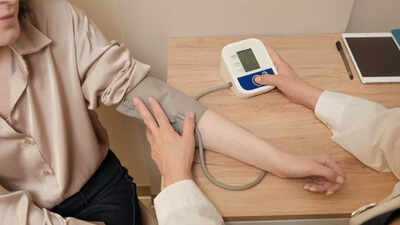High blood pressure, also known as hypertension, is a widespread yet frequently undiagnosed condition. Often called the “silent killer,” it typically shows no obvious symptoms, meaning many individuals are unaware their blood pressure is elevated. Left unmanaged, it can lead to serious health complications such as heart disease, stroke, and kidney problems. Recognising the risk factors, monitoring blood pressure regularly, and adopting healthy lifestyle habits are essential for prevention and control. Early detection, combined with proper management through diet, exercise, stress reduction, and medication when necessary, can significantly reduce long-term health risks.
10 blood pressure myths and facts you need to know
1. Myth: High blood pressure is only over 140/90 mm HgFact: High blood pressure is over 130/80 mm HgAccording to the American Heart Association, it has lowered the threshold for diagnosing hypertension. Even slightly elevated blood pressure can increase your risk of heart disease, stroke, and kidney problems over time. This redefinition underscores the importance of monitoring blood pressure regularly, maintaining a healthy lifestyle, and seeking early intervention. Many people who previously considered themselves “borderline” are now encouraged to take proactive steps to protect their cardiovascular health.2. Myth: High blood pressure runs in my family, so I can’t prevent itFact: Lifestyle choices can significantly influence blood pressureWhile genetics does play a role in predisposing individuals to hypertension, lifestyle factors such as diet, exercise, stress management, and sleep quality can make a significant difference. Eating a balanced diet rich in fruits, vegetables, and whole grains, engaging in regular physical activity, maintaining a healthy weight, and limiting alcohol consumption can help reduce your risk, even if you have a family history of high blood pressure. Proactive management can delay or even prevent the onset of hypertension.3. Myth: I don’t use table salt, so my blood pressure is safeFact: Sodium from processed foods can raise blood pressureMany people underestimate the amount of sodium they consume. While avoiding table salt is a good start, processed and packaged foods often contain hidden sodium, which can contribute to elevated blood pressure over time. Canned soups, sauces, ready meals, and snack foods are common culprits. Reading nutrition labels carefully and opting for fresh or minimally processed foods can help keep sodium intake within healthy limits.4. Myth: I feel fine, so I don’t need to worry about high blood pressureFact: Hypertension is often symptomlessHigh blood pressure is often called the “silent killer” because it can damage arteries, the heart, kidneys, and brain without causing noticeable symptoms. Many people feel completely healthy, while their blood pressure is gradually causing harm internally. Regular monitoring, either at home or in a clinical setting, is crucial for early detection. Even minor increases in blood pressure over time can have long-term consequences if left unmanaged.5. Myth: I can stop taking my blood pressure medication once my numbers improveFact: Hypertension is typically a lifelong conditionBlood pressure medications control elevated readings but do not cure hypertension. Discontinuing treatment without medical guidance can cause blood pressure to spike again, increasing the risk of heart attack, stroke, and other complications. Patients should work with their healthcare provider to adjust medications if necessary, but should never stop taking prescribed treatment on their own. Long-term adherence is essential for maintaining cardiovascular health.6. Myth: Only older adults get high blood pressureFact: Hypertension can affect all age groupsWhile high blood pressure becomes more common with age, it can develop in teenagers, young adults, and middle-aged individuals as well. Risk factors such as obesity, poor diet, physical inactivity, chronic stress, and certain medical conditions can contribute to hypertension at a young age. Regular check-ups and lifestyle interventions are vital for all age groups, not just older adults, to prevent long-term health consequences.7. Myth: Alcohol doesn’t affect blood pressureFact: Excessive alcohol intake can raise blood pressureDrinking alcohol in moderation may be safe for most people, but heavy or regular drinking can contribute to elevated blood pressure. Alcohol can also interact with blood pressure medications, reducing their effectiveness. Limiting alcohol consumption and practising moderation is a simple but effective way to support healthy blood pressure levels. Reducing intake may also improve sleep, weight management, and overall cardiovascular health.8. Myth: A single blood pressure reading is enoughFact: Multiple readings provide a more accurate assessmentBlood pressure fluctuates naturally throughout the day due to factors like stress, physical activity, and diet. A single reading may not reflect your typical blood pressure. Taking multiple readings at different times and recording trends gives a more accurate picture, allowing you and your healthcare provider to make informed decisions about treatment or lifestyle adjustments. Home monitoring is especially helpful for identifying patterns and preventing “white coat hypertension,” where readings are elevated in a clinical setting but normal at home.9. Myth: Home blood pressure monitoring is unnecessaryFact: Home monitoring is highly beneficialRegularly checking your blood pressure at home helps track trends and provides useful data for your healthcare provider. It can reveal patterns that occasional clinic measurements might miss, such as elevated readings in the morning or after certain meals. Home monitoring also empowers individuals to take control of their health, stay motivated, and make timely lifestyle changes when needed. Investing in a reliable blood pressure monitor and learning proper measurement techniques is a practical step for long-term management.10. Myth: If my blood pressure improves with medication, I can stop taking itFact: Medication is usually required long-termEven if your blood pressure normalises with medication, stopping treatment can lead to a dangerous rebound effect. Hypertension is generally a chronic condition, and long-term management often requires continued medication alongside healthy lifestyle habits. Periodic medical reviews can help adjust dosages or medications if necessary, but consistent adherence remains crucial for preventing complications.Disclaimer: This article is for informational purposes only and should not be considered medical advice. Please consult a healthcare professional before making any changes to your diet, medication, or lifestyle.Also read | Cysts vs. Tumours: How to tell the difference between harmless and dangerous lumps
